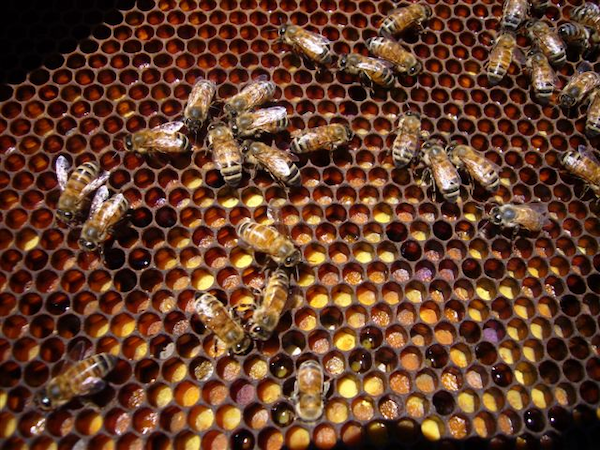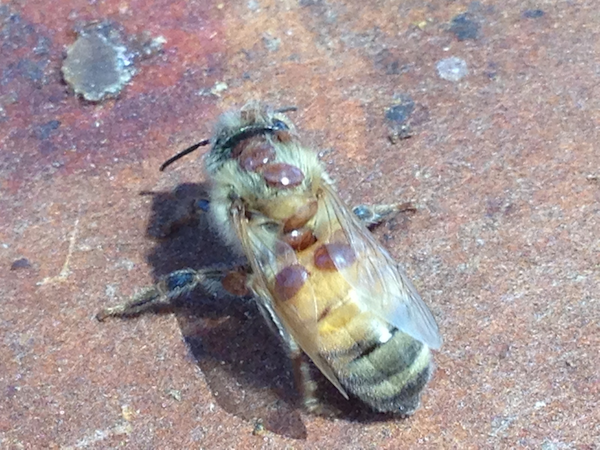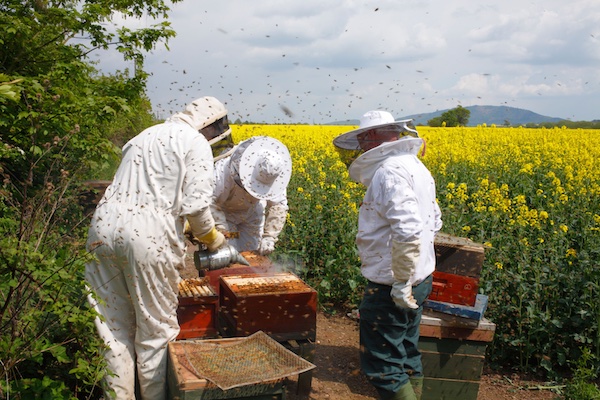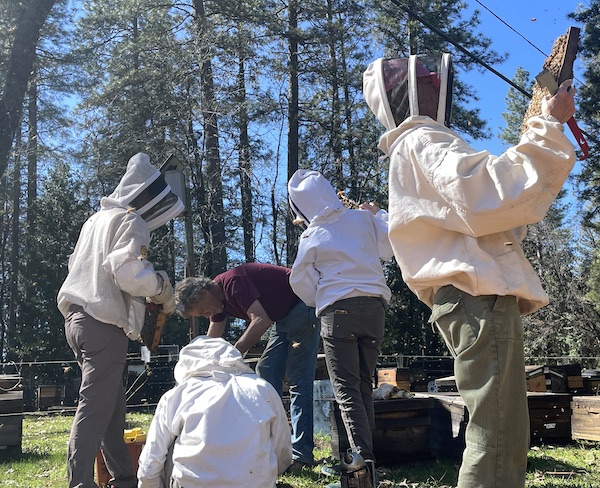ScientificBeekeeping is a not-for-profit enterprise, and I’m happy to receive notes of thanks for how information on this site has contributed to my readers’ success at beekeeping (and sometimes saved them hundreds or thousands of dollars). It is your support that allows me to devote my life to this site. All donations go towards website maintenance, bee research costs (typically tens of thousands of dollars per year), re-donations to fund research by others, and a small amount to partially offset the huge number of hours that I spend in research and writing. I guarantee that every penny is pinched and well spent!
I appreciate the notes of support that I receive from all over the world. Seeing who is donating, their locations, and the little notes that come with contributions help to let me know how I should direct my research and writing. In appreciation, and in order to show who is supporting my research and writing, I honor below those who have recently made substantial donations:
REGULAR SERIOUS DONORS
Tracy Fasanella
Brandon Hertel
* Homestead in the Hood, Colorado
DaleLesser, Michigan
Conway Veterinary Hospital
Matthew McLean, Colorado
Jim & Paulette Lynn, Iowa
Karen Barnhart, Iowa
Jean Knudsen
Yumei Xiong
Thomas Kirwan
Andrew Dewey, Maine
Madeline Mead
Jill Lambie-ponce
RECENT MAJOR SUPPORTERS
Tualatin Valley Beekeepers, Oregon
Denis Watts
Kebin Duesman
James Jakim, Pennsylvania
Los Angeles County Beekeepers
Justin Ray
Alameda County Beekeepers Association, CA
Santa Clara Valley Beekeepers Guild, CA
Ihor Skrypka
Mike Tooley
Chatham County Beekeepers Association
Darren Tressider
Charles Clark
Victorian Apiarists’ Association
Peter Krey
Chrisensen Family Apiaries, Michigan
Nebraska Beekeepers Assoc.
Hiatt Honey LLC
Miller Honey Farms, California
Paul Hosticka, Washington
Tualatin Valley Beekeepers Association, Oregon
Merrimack Valley Beekeepers, NH
Colorado State Beekeepers Assoc.
Alameda County Beekeepers Assoc, Calif
New Mexico Beekeepers Assoc
Colonial Beekeepers Assoc, Virginia
Help Save the Bees Foundation, Nevada
James Jakim, Pennsylvania
RECENT $100+ SERIOUS SUPPORTERS
Rick Hyde
Mohawk Valley Trading Company
Ron Morrison
Susan Ament
Richard Reid
San Mateo Bee Guild, California
Zach Suddaby
Cara Ching, California
Vincent Aloyo, Pennsylvania
Rick Anderson, Kansas
Perry County Beekeepers Club
Lawrence Huba
Charles Reichert
Charles Clark
Charlean Andes
Always Summer Herbs, Florida
Bill Hall
David George
Dean Christie
Roy Manicke
Jersey Cape Beekeepers Association
Kansas Honey Producers Association
New Hampshire Beekeepers Association
Chester County Beekeepers Assoc, Pennsylvania
Debbie Hewitt, Maryland
Mile Hive Bee Club, Colorado
Dale Lesser, Minnesota
Santa Clara Valley Beekeepers Guild, California
Stevan Huffman, Alaska
Flower Street Farm
Cara Ching, California
Terry Barrett
Robert M Simonson
Vincent Aloyo, Pennsyvania
Byron Godard
Southern Oregon Beekeepers Association
Lawrence Chismar
Middlesex Beekeepers Association, Massachusetts
Montgomery County Beekeepers, Maryland
Charles Clarke, California
Andrew Dewey
Ralph Carter, California
Barnstable County Beekeepers Association
Mary Aho
Sonja Percival
New York Bee Wellness
Liz and Terry Huxter
David Ball
Paul W. Garges
Andrew Levi
Jim Veitch, California
Mark Simonitsch, Massachusetts
Kenneth Sallitt
Kelle Frymire
Tamiko Panzella, California
Rodd Hall, Wisconsin
James Baerwald
Jean Knudsen
Yosef Shochat, Israel
Nicolas Geant
Charles Clark
Merrimack Valley Beekeepers
Michael Cummings
Bryce Lord
Jersey Cape Beekeepers
Busy Bee Honey, Vermont
Rick Anderson
Steve Sweet, Idaho
Ulster County Beekeepers Association
Jan Lawson
Honey Bee Club of Stillwater, Minnesota
Black Hills Area Beekeeping Club, South Dakota
Richard Ozero, Alberta
Paul Yanus, Vermont
Suddabees Honey LLC
Dean Christie
New Hampshire Beekeepers Association
Jane Sebring
Vincent Aloyo
Connecticut Beekeepers Association
Jim Lyssy
Wyoming Beekeepers Association
Tualatin Valley Beekeepers, Oregon
Yosef Shochat
Dale Lesser
Jill Lambie-ponce
Deborah Corcoran
Justin Ray
Idaho Honey Producers Association
Capital Area Beekeepers Association, PA
Mark Simonitsch, MA
Central Maryland Beekeepers Association
Roy Manicke
Kansas Honey Producers Association
Charles Bailey Jr
Richard Reed
Gregory Quinn
John Allison
Joshua Sewell
Chris Abbot, Virginia
Owyhee Honey Company
Idaho Honey Ranch
Mount Diablo Beekeepers Association, California
Charles Bailey Jr
Raritan Valley Beekeepers Association
Mike Tooley
Los Angeles County Beekeepers Association
Santa Clara Valley Beekeepers Guild
Pamela Stegemerten
Vermont Beekeepers Association
Los Angeles County Beekeepers Association
Michael Kurtz
Dan Geer
Ross Honey Company
Steven Greenwood
Julie Spezia
Stephen Lamb, California
Pam Rogers, Indiana
El Dorado Beekeepers, California
Bill Mares, Vermont
Mike Stoops
Adam Bagerski, Oregon
Dorothy Hammett
Janine Cohen, California
Neil Nordquist, California
Richard Hyde, California
Bonnie Bee & Co., California
Merrimack Valley Beekeepers Association, New Hampshire
Laura Risk, Colorado
Capital Area Beekeepers Association, Pennsylvania
West Sound Beekeepers Association, Washington
Beekeepers’ Guild San Mateo, California
Omaha Bee Club, Nebraska
Joplin Area Beekeepers Association
Steve Sweet, Idaho
Bill’s Bees
Rich Blohm, New York
James Baerwald
Kip Glass, Missouri
Charles Vorisek
Carlos Perez, California
Debra Morey
Margaret Varney
Chester County Beekeepers Association, Pennsylvania
Thomas Dahl
Vince Aloyo, Pennsylvania
Charles Bureau
Help Save the Bees Foundation, Nevada
Aaron Bergman, Florida
Alan Herzfeld, Idaho
Eli’s Bees, California
Ghislain De Roeck, Belgium
Buncombe County Beekeepers, North Carolina
Robert Holcombe, Rhode Island
Alex Naumenko, Florida
Honey Bee Club of Stillwater, Minnesota
New Hampshire Beekeepers Association
Merrimack Valley Beekeepers, New Hampshire
Blossomwood Honey, Al
Bee Thankful Raw Honey
Skip Smith
Jean Knudsen
Jason Hough, Maryland
Tualatin Valley Beekeepers, Oregon
Craig Falls, New York
Michael Aaby, Maryland
Keith Scott
Randall Carter, Alabama
Thomas Kirwan
Nicolas Geant, California
Lee Bussy
Jean Knudsen
Andrew Dewey, Maine
Jason Wester, MIchigan









